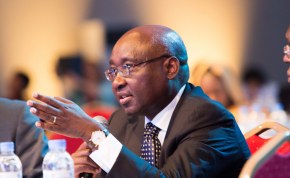Economic Empowerment
Economic changes in recent decades have shifted traditional power structures and witnessed the emergence of concepts that emphasize gender equality. It is acknowledged that across the continent, women play a pivotal role in agricultural production, rural economy, household-level nutrition and the reduction of rural poverty. Therefore, the promotion of African women and their access to finance plays a key role at the African Development Bank's Annual Meetings in Kigali.
"The Africa we want gives room for greater innovation and stronger leadership to involve the full potential of men and women, young and old," says AfDB's Special Envoy on Gender, Geraldine Fraser-Moleketi.
Fraser-Molektei contends if women had the same access to productive resources as men, they could increase farm yields and raise agricultural output enough to lift 150 million people out of hunger.
"To create the necessary scale, one of the ways the Bank will do this is through building and capitalising on women's technical and financial capacities to harvest their dividend," she says.
"In essence, it is an Africa that provides a thriving environment for women and men to engage equitably in enterprise and public service delivery, and where no African men and women face institutionalised insecurity."

Fraser-Moleketi wants to see a continent that uses its resources fairly and is fully engaged in finding domestic solutions for its people. She believes that "the first and most important thing is that African people – men and women – have to join hands to continue building on their capacities."
To that end, the AfDB's strategy aims to tackle gender inequality through economic empowerment, improved legal and property rights and generating knowledge pertinent to gender equity.
Fraser-Moleketi claims "the institution will look to strengthen the economic foundations that empower women and equip them with skills and knowledge so that they can take advantage of economic opportunities."
The Special Envoy on Gender notes that the Bank's agenda supports efforts to grow viable women-led businesses and MSMEs, and capitalise on the important role women have in managing natural resources and the environment.
Agenda 2063, the African Union's vision for the next 50 years, looks to ensure a continent that is integrated, peaceful and growing, but also where no one is left behind, Fraser-Moleketi says.
"Business as usual will not get us to the Africa that rewards talents, creativity, and entrepreneurial vigour from both sexes.
"To get to that, I believe that it is imperative that African states invest seriously into gender equality."
